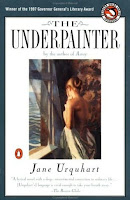By Kim
Two years ago I read The Underpainter, a novel by Jane Urquhart. The protagonist, Austin Fraser, creates a series of paintings depicting the people who touched his life and then erases the details by applying progressively lighter shades of paint. Over the course of the novel, the paintings become a metaphor for how an emotionally crippled man has avoided life. Jane Urquhart herself said in a June 2001 interview with January Magazine that she ‘hadn’t expected [ couldn’t publish the book.
couldn’t publish the book.
The Underpainter is the first and only book I’ve ever thrown across the room in disgust. After hearing the satisfying clunk against the wall, I promptly retrieved it and kept reading. As despicable as
Around this time my aunt discovered a box in her attic containing eight drafts of a biography that my great-grandmother, Madonna, wrote about her husband, landscape painter Carl Ahrens. While I had a copy already and didn’t expect to find much new there, I skimmed page after page of onionskin paper, struggling to decipher the handwritten notes in the margins. My reward: ten pages worth of recollections that never made it into the version Madonna bound and donated to libraries back in 1945.
Learning of my discovery, several of my contacts from historical societies around
The drafts are a series of portraits of the same man, some flattering, some severe. The image Madonna clearly wished the world to see is reminiscent of a Bronte hero – tall, dark and brooding. While she alluded to his temper, she emphasized his gentleness in reverential tales of Carl engineering a prosthetic leg for his rooster or delighting his children by reviving a failing honeybee. She declared him a ‘wonderful and steadfast lover and a faithful husband,’ describing their relationship as companionable, passionate, with a few storms thrown in to keep things interesting. As a painter, Carl was a frustrated genius, worn down by constant illness and pain, unfairly ostracized for his individuality and his divorce from his first wife. Yes, he was cantankerous and sometimes difficult, she admitted, but with cause.
My aunts confirmed my suspicion that Madonna placed an airbrushed version of Carl on the highest pedestal she could find. They said my grandmother lamented that her childhood home was anything but harmonious. Her parents’ love for each other was obsessive, all-consuming, their arguments equally as passionate as their reconciliations. While I knew Madonna carefully concealed Carl’s warts out of love, I was intrigued by the thought of just where those warts may be and how deepl
I got my first clue when I found the following handwritten passage tucked inside the last draft, as though Madonna knew I would unearth it someday: He was afraid of my youth, my [singing] voice, even my appearance, and wanted to make sure of keeping me all for himself by shutting out every aspect of my life which he could not entirely dominate. It was quite understandable. He had changed the whole course of his life because he loved me…and said that so long as he had me, he did not need anyone else to make up his happiness. As he gave his love freely and without compromise, entirely to me, he not only wished, but demanded the same in return. He must be first, before the children, before music, before anything at all, and not only first, but second and third as well.
After I read this, I glared at a photo of my great-grandfather, arms crossed over my chest, and declared, “Explain yourself, please.” I heard no reply, of course, but my eyes drifted to his cane, and I empathized enough to imagine myself in his place. If I were afflicted with a crippling and excruciating illness that left me unable to care for myself, would I not cling to the one person on whom my survival depended? If that person were half my age, attractive, and had many admirers, would I not live in constant terror of being left alone to die?
Madonna’s version of events would only show Carl through the eyes of a woman in love. The narrative would be rosy and sweet, but it would also only tell half the story. As a wife, mother, and historian, I couldn’t gloss over the fact that Carl abandoned his first wife and their three children, no matter what his motives. The stories passed down by Carl’s son may have been exaggerated out of (justifiable) bitterness, but I believe Carl’s first family often faced the cruel streak that even Madonna admitted he possessed. I took careful notes, thankful that he was merely a verbal tyrant, not a brute, and agonized over how best to work in some of his most despicable behavior.
Writing those scenes infuriates me and it often takes a few days for me to forgive Carl enough to move on. Did I ever consider leaving them out? Not a chance. The most satisfying moment of my life as a writer was when one of my critique partners wrote at the end of one paragraph that she didn’t like Carl very much and, six sentences later, claimed to love him again. This contrast not only makes him a memorable character, but it’s likely a more accurate portrayal of the real man than those given by accounts from people with motives to protect or condemn.
Do I hope that readers will someday throw The Oak Lovers across the room? Sure. I hope to make them laugh and cry as well. Writers can’t have this sort of power over the emotions of strangers without taking risks, without unflinchingly exposing the flaws of the characters we create and letting them be judged accordingly. In the case of Austin Fraser, I’m still not sure of a verdict after two years of deliberations. That says a lot about the power of Jane Urquhart’s pen.

